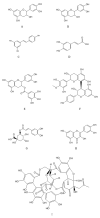Beneficial Effects of Dietary Polyphenols on Gut Microbiota and Strategies to Improve Delivery Efficiency
- PMID: 31540270
- PMCID: PMC6770155
- DOI: 10.3390/nu11092216
Beneficial Effects of Dietary Polyphenols on Gut Microbiota and Strategies to Improve Delivery Efficiency
Abstract
The human intestine contains an intricate ecological community of dwelling bacteria, referred as gut microbiota (GM), which plays a pivotal role in host homeostasis. Multiple factors could interfere with this delicate balance, including genetics, age, antibiotics, as well as environmental factors, particularly diet, thus causing a disruption of microbiota equilibrium (dysbiosis). Growing evidences support the involvement of GM dysbiosis in gastrointestinal (GI) and extra-intestinal cardiometabolic diseases, namely obesity and diabetes. This review firstly overviews the role of GM in health and disease, then critically reviews the evidences regarding the influence of dietary polyphenols in GM based on preclinical and clinical data, ending with strategies under development to improve efficiency of delivery. Although the precise mechanisms deserve further clarification, preclinical and clinical data suggest that dietary polyphenols present prebiotic properties and exert antimicrobial activities against pathogenic GM, having benefits in distinct disorders. Specifically, dietary polyphenols have been shown ability to modulate GM composition and function, interfering with bacterial quorum sensing, membrane permeability, as well as sensitizing bacteria to xenobiotics. In addition, can impact on gut metabolism and immunity and exert anti-inflammatory properties. In order to overcome the low bioavailability, several different approaches have been developed, aiming to improve solubility and transport of dietary polyphenols throughout the GI tract and deliver in the targeted intestinal regions. Although more research is still needed, particularly translational and clinical studies, the biotechnological progresses achieved during the last years open up good perspectives to, in a near future, be able to improve the use of dietary polyphenols modulating GM in a broad range of disorders characterized by a dysbiotic phenotype.
Keywords: delivery systems; dietary polyphenols; dysbiosis; gastrointestinal diseases; gut microbiota; metabolic disorders.
Conflict of interest statement
The authors declare no conflict of interest.
Figures




Similar articles
-
Beneficial Effects of Phenolic Compounds on Gut Microbiota and Metabolic Syndrome.Int J Mol Sci. 2021 Apr 2;22(7):3715. doi: 10.3390/ijms22073715. Int J Mol Sci. 2021. PMID: 33918284 Free PMC article. Review.
-
Polyphenols as modulators of pre-established gut microbiota dysbiosis: State-of-the-art.Biofactors. 2022 Mar;48(2):255-273. doi: 10.1002/biof.1772. Epub 2021 Aug 16. Biofactors. 2022. PMID: 34397132 Free PMC article. Review.
-
Gastrointestinal Disorders and Metabolic Syndrome: Dysbiosis as a Key Link and Common Bioactive Dietary Components Useful for their Treatment.Int J Mol Sci. 2020 Jul 13;21(14):4929. doi: 10.3390/ijms21144929. Int J Mol Sci. 2020. PMID: 32668581 Free PMC article. Review.
-
Microbial dysbiosis-induced obesity: role of gut microbiota in homoeostasis of energy metabolism.Br J Nutr. 2020 May 28;123(10):1127-1137. doi: 10.1017/S0007114520000380. Epub 2020 Feb 3. Br J Nutr. 2020. PMID: 32008579
-
[Physiological patterns of intestinal microbiota. The role of dysbacteriosis in obesity, insulin resistance, diabetes and metabolic syndrome].Orv Hetil. 2016 Jan 3;157(1):13-22. doi: 10.1556/650.2015.30296. Orv Hetil. 2016. PMID: 26708682 Review. Hungarian.
Cited by
-
Beneficial Effects of Phenolic Compounds on Gut Microbiota and Metabolic Syndrome.Int J Mol Sci. 2021 Apr 2;22(7):3715. doi: 10.3390/ijms22073715. Int J Mol Sci. 2021. PMID: 33918284 Free PMC article. Review.
-
Exploring the Chemical Composition of Female Zucchini Flowers for Their Possible Use as Nutraceutical Ingredient.Antioxidants (Basel). 2023 Dec 13;12(12):2108. doi: 10.3390/antiox12122108. Antioxidants (Basel). 2023. PMID: 38136227 Free PMC article.
-
Natural Bioactive Compounds Useful in Clinical Management of Metabolic Syndrome.Nutrients. 2021 Feb 16;13(2):630. doi: 10.3390/nu13020630. Nutrients. 2021. PMID: 33669163 Free PMC article. Review.
-
Gut microbiota analyses of cutaneous T-cell lymphoma patients undergoing narrowband ultraviolet B therapy reveal alterations associated with disease treatment.Front Immunol. 2024 Jan 11;14:1280205. doi: 10.3389/fimmu.2023.1280205. eCollection 2023. Front Immunol. 2024. PMID: 38274799 Free PMC article.
-
Consideration of Gut Microbiome in Murine Models of Diseases.Microorganisms. 2021 May 14;9(5):1062. doi: 10.3390/microorganisms9051062. Microorganisms. 2021. PMID: 34068994 Free PMC article. Review.
References
Publication types
MeSH terms
Substances
Grants and funding
- UID/NEU/04539/2013/Fundação para a Ciência e a Tecnologia
- UID/NEU/04539/2019/Fundação para a Ciência e a Tecnologia
- PTDC/SAU-NUT/31712/2017/Fundação para a Ciência e a Tecnologia
- POCI-01-0145-FEDER-007440/Programa Operacional Temático Factores de Competitividade
- POCI-01-0145-FEDER-031712/Programa Operacional Temático Factores de Competitividade
- CENTRO-01-0145-FEDER-000012-HealthyAging2020/Programa Operacional Temático Factores de Competitividade
- AKS, RK and RG Senior/Junior research fellowship/Council of Scientific & Industrial Research, India
- AKS, RK, RG, HKR, AG and AKP acknowledgment/Fund for Improvement of S&T Infrastructure (FIST) of the Department of Science & Technology (DST), India
- AKS, RK, RG, HKR, AG and AKP acknowledgment/UGC-SAP, India
LinkOut - more resources
Full Text Sources

